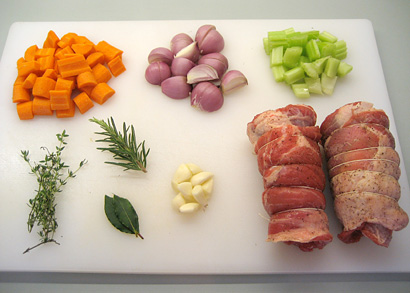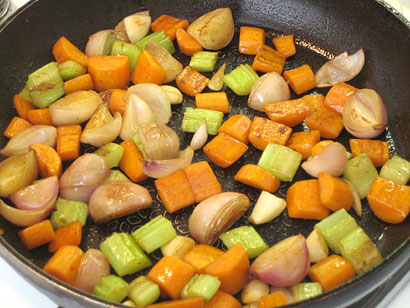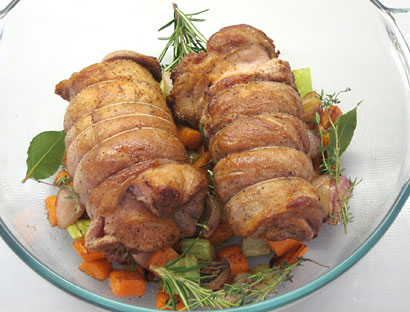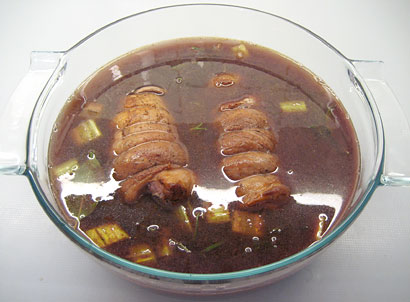Braised Lamb / Lamb Shanks
Braised Lamb / Lamb Shanks
to your Favourites...

This slow cooked lamb dish can be done with almost any sizable piece of lamb and produces meat as soft as butter and full of flavour.
Ingredients
- whole shoulder of lamb or
- half-shoulder of lamb or
- whole leg of lamb or
- half leg of lamb or
- lamb shank
- 750ml (1 bottle) red wine (preferably Côte de Rhône)
- 500ml fresh lamb stock
- 500ml fresh beef stock
- 140g shallots (4)
- 150g carrots (2)
- 80g celery (1 stick)
- 3 cloves of garlic
- 1 sprig of thyme
- 1 sprig of rosemary
- 2 bay leaves
- 2 tablespoons of vegetable oil
- greaseproof paper
Preparation Time: 20 minutes
Cooking Time: 3 - 4 hours
Serves: Whole cut of meat serves 6, half cut serves 4, 1 lamb shank per person
Method
- This dish can be cooked on the hob or in the oven. If you want to cook it in the oven, preheat the oven to 170°c.
- Peel the carrots and shallots and chop them with the celery into small pieces (about the size of your thumbnail). Peel the garlic and chop each clove in half.
- If you are using a whole cut or a half cut of meat, remove the bone, roll up the meat and tie it tightly with string (or get your butcher to do this). If using lamb shanks, leave them intact with the bone in.

- Heat one tablespoon of oil in a frying pan over a medium heat, season the lamb with salt & pepper, put it into the pan and fry it until it is brown all over (Tip: use barbeque tongs to turn the lamb over). Then transfer the lamb to a plate.

- In the same pan, heat the other tablespoon of oil and fry the carrots, shallots, celery and garlic until they begin to turn brown.

- Put the vegetables into a pot with a lid, large enough to hold the lamb (if the lamb is too big for any of your pots, cut it in half, but remember to fry the cut ends). Then put the lamb into the pot on top of the vegetables and add the thyme, rosemary and bay leaves.

- Add the red wine to the frying pan, bring it to the boil and scrape off any bits stuck to the bottom of the frying pan. Then pour the wine into the pot with the vegetables and meat.
- Add the beef and lamb stock to the pot.

- If the liquid does not cover the lamb, top it up with water.
- If you are cooking the lamb on the hob, bring it to the boil and then turn down the heat to a gentle simmer.
- Place a piece of greaseproof paper larger than the diameter of the pot on top of the liquid and put the lid on.

- Either simmer it gently or put it in the oven for:
whole shoulder of lamb 4 hours,
half-shoulder of lamb 3 hours,
whole leg of lamb 4 hours,
half leg of lamb 3 hours,
lamb shank 3 hours. - Remove the lamb from the pot, sieve the liquid into another pan, discard the vegetables and boil until the liquid has reduced by three quarters and become thicker to make the sauce.

- Place the lamb back into the first pot, pour over the sauce and gently reheat the lamb for about ten minutes.
- Cut the lamb into portions (do not attempt to carve it into thin slices as it will break apart) and serve. Here, we served it with mashed potatoes and spinache purée.

Useful Information
Can it be frozen? Yes, allow the lamb to naturally defrost and then reheat it as in stage 15
Can it be prepared in advance? No.
Will leftovers be nice? Yes, for up to 3 days.
Notes
- Braising is a similar process to stewing, the difference is that you are cooking a single, large piece of meat. With braising, the meat sits on top of the vegetables to prevent it sitting on the bottom of the pan, this ensures that the meat is surrounded by liquid and cooks evenly.
- Browning the meat first, ensures that the meat has a good colour at the end of cooking and also caramalises the natural sugars in the meat which enriches its flavour (known as "the Maillard reaction").
- Putting greaseproof paper on the surface of the liquid helps prevent evaporation from the pan and, if the level of the liquid fall below the top of the lamb, it will also help to keep the lamb moist.
- Traditionally, braised meat was served with the vegetables from the pot, however, after three hours of cooking, much of their flavour will have been extracted into the sauce, so freshly cooked vegetables are much preferred.
Sponsored Links

